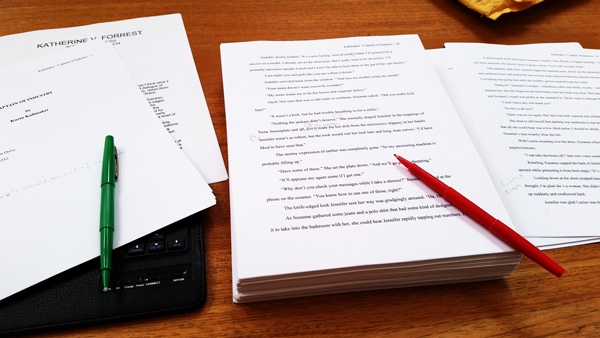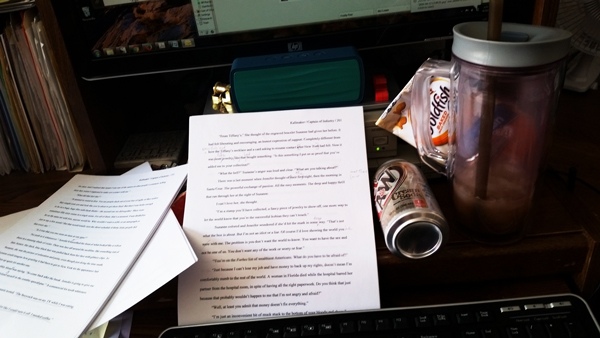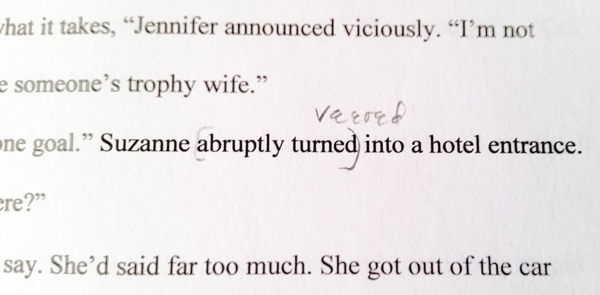CONTENTS
That’s Right, Editing is a Joyful Unicorn Ride
When I finally type the words The End, my writer brain loathes the book and regrets ever becoming a writer when accounting was so, so much easier. Then ping! Editor Brain takes over and we’re in love. So much to critique and fix. Seriously, this happens about five minutes after Writer Brain has slunk into the darkness dragging what’s left of the Pringlesinto a cave.

Editor Brain Gets Out the Whips
Editor Brain re-reads over and over, reads it aloud, reads one point of view in order, then the other, checks continuity and crows over every fixed flaw. Editor Brain succeeds where Writer Brain failed and since they share a brain, it’s still all good even when the fur flies.
Editor Brain requires far less chocolate and deep fried salted products. Writer Brain is nowhere near as snarky.
Time for the Swedish Moose
The final stage is having Acrobat read it to me from a PDF version, using its odd little Swedish Moose voice. That process catches even more minute errors that the eye misses: than instead of then, a missing a, or on instead of or. Muscle memory always types her instead of him, she instead of he. If it’s short and easy, it’s fixed right then and there.
But Editor Brain notices other issues. Each of these passes results in a FIX list – notes about a generic error, missed opportunity, or a flaw that must be addressed. Editor Brain’s Sarcasm Flag flies at full mast. The list will have items like:
- Check the time line of “Earth Tides” it can’t appear before part 2.
- What’s the driving range of a Tesla – they just drove 500 miles without stopping. Yeah, it sounded good but do your research next time. P.S. Women of a certain age. Bladders. Rethink this.
- What happened to the dog? Someone’s going to worry that she’s not fed or petted it in weeks. You do not need to hear from the dog lesbians on this issue.
- Nuke the pathetic ellipses. Nobody is a fainting ingenue. (Editor Brain prods Writer Brain just to make sure there’s whimpering.)
- Does her father have a name? Was this a family secret or something? Oh look, her mother doesn’t have a name either.
- It was winter six months ago, now it’s winter again. This is not Game of Thrones.
- Do you think she could sip that coffee a few more times in this scene? Seven is just not enough.
After the Sarcasm, the Fixing
And so on. I revisit these notes until they are all incorporated or abandoned, a process of weaving, picking apart and reweaving. Picking apart. Reweaving. Spackle and duct tape. With heaps of sarcasm until Writer Brain has come out of the cave and rejoined the process where new text is required. Editor Brain never shuts up, but does get tired – more of a sprinter. Writer Brain is all about endurance and will win any head-to-head competition because the entire process is a marathon.

Then the Manuscript goes to a Real Editor
I’m fortunate to have worked with several and my last half-dozen books have been back in the hands of the wonderful Katherine Forrest. Since she knows my work she does not spend a lot of time explaining herself. When she writes “What does she look like?” next to a paragraph I know my crime against good craft.
Solutions are offered to the big issues. I wasn’t sure about needing an epilogue, the editor is sure. The editor notices that the central driving theme that has shaped every choice and emotional turn in the story wasn’t addressed in the epilogue. (Editor Brain and Writer Brain slink to cave with Pringles to share.)
But Wait, There’s More
Like my FIX list, her cover letters are a blueprint for picking apart and reweaving. Only this time it’s not my sarcastic editor brain, it’s someone outside my head who is nice. And better at editing than I will ever be.

The marked up manuscript itself is where most of the ::headdesk:: moments are. Where the fact that I’ve used both makeup and make-up and that I forgot to italicize the names of television shows comes to light. When I’ve overused the words abruptly and well. And yes, attempted to transform a character into a hotel driveway.
Writer Brain and Editor Brain Throw Shade
Writer Brain points out these oversights to Editor Brain (payback’s a bitch) and they wrangle about who should have gotten it right. The Pringles disappear.
So, so many things that I know better and didn’t do better.
It’s not that my manuscript should have been perfect, it should have been as perfect as I could make it. Silly things, like not capitalizing “T-shirt” are a waste of my editor’s time. Better for her and the final book for her attention to be on a clunky phrase that could be easily smoothed out.
But Really, There’s a Reason Why Professionals Exist
So here’s an example of what one small part of the editor’s craft looks like.
What I wrote:
Jennifer hardly noticed the blocks until they reached Bleeker Street. They were standing in front of the unassuming door to the studio, without the time seeming to have even been passing.
I knew something wasn’t right. It’s too long, has too many beats, the clause at the end just hangs there. I remember struggling to get that onto the page. A simple couple of transitional sentences – these are often the hardest for me to write. Readers ought to flow right over the words and into the next scene, but instead I’d given them something to stumble through.
Enter the editor with two insertions and a deletion (and a correction):
Jennifer hardly noticed the blocks passing until they reached Bleecker Street and were standing in front of the unassuming door to the studio.
My poor little lumpy passage has been lovingly trimmed and cared for, made sleek and simple. I am humbled, grateful, and will try to do better next time.
In the long run will this change sell another copy of the book? Highly unlikely. But in the final stage of finishing a book I’m not thinking about that. Neither is the editor. We both want it to be a good book.
Do the best you can do at the time, and produce the best book you can.
Then get good help.

